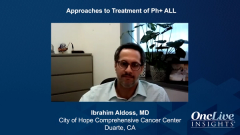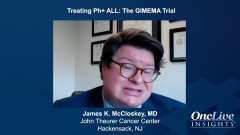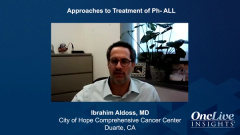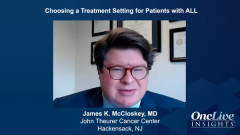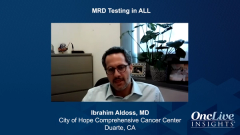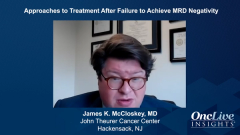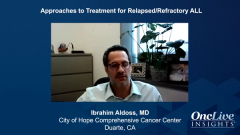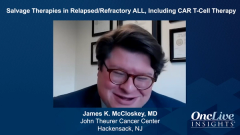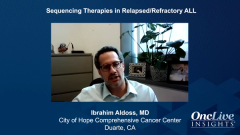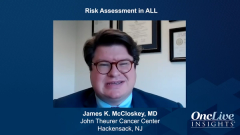
Choosing a Treatment Setting for Patients With ALL
Drs Aldoss and McCloskey share their thoughts on treating patients with ALL at community centers versus at tertiary, academic medical centers.
Episodes in this series

Ibrahim Aldoss, MD: Which patients with Philadelphia chromosome-positive [Ph+] acute lymphoblastic leukemia may be safely treated in the community setting versus being referred to tertiary centers? Let’s extend that also to Philadelphia chromosome-negative [Ph-], James. What’s your opinion on that?
James K. McCloskey, MD: This is always a challenge, right? As leukemia physicians, we would love to be able to see everyone. Especially in New Jersey where we’re a densely populated state, one of the most rewarding things has been establishing a good relationship with local oncologists. When patients can travel, and especially in the era of telemedicine, almost everyone benefits from some interaction with a leukemia specialist. These are still rare diseases. With some of these approaches, patients could still be treated at home but seen with us. Particularly in the Philadelphia chromosome-negative setting and patients receiving pediatric-inspired regimens, my sense is that those patients often do benefit from seeing a physician at a tertiary center. These are often complex regimens with unique toxicities and maintaining dose intensity is important. That can be particularly valuable, but I recognize it’s not always possible for folks to get to us. I think particularly patients with Ph+ disease, receiving steroids and TKIs [tyrosine kinase inhibitors], or TKIs and steroids with dose-reduced chemotherapy, those could be easily managed locally, but there could be a real benefit to having a relationship at a tertiary center for MRD [minimal residual disease] monitoring and assessments along the way.
Ibrahim Aldoss, MD: Thank you, James. I completely agree with you. Maybe we’re having more of the problem here in California compared to New Jersey, since it’s a large area here. Patients sometimes travel for 3, 4 hours to come to our centers. But I agree, especially Ph- ALL [acute lymphoblastic leukemia] in the AYA [adolescent and young adult] population, where the goal is to cure using pediatric-inspired regimens, which are complex. For general oncologists who rarely treat ALL, these regimens are very complicated for the treating physician in terms of toxicity, the way to administer these drugs. I think that at least the patients benefit from having the induction in the tertiary leukemia centers since induction tends to have the highest risk of treatment mortality. At least they can be treated in the tertiary center at the beginning. Once in the remission, maybe they can move back locally and we can work in conjunction with the community doctor to treat the patient. But also, many times we get patients after induction, they are remission, and we don’t have full genetic assessments of their disease. It’s hard to recommend transplants or not in this setting. They rarely check MRD in the community, I would say. For some patients who end up having high-risk leukemia, there’s a benefit of…the patient in case early transplant is needed. And one advantage is the availability of some of the clinical trials that include novel therapies that can benefit the patient and can advance the science if they presented to the leukemia center rather than a community hospital. And for Ph+, I agree, especially after induction, if the management is with TKIs, the increase in steroids is easily managed in the community. Again, you have to have a good relationship with the community doctor and they can call you any time if they need to co-treat the patient.
Transcript Edited for Clarity


